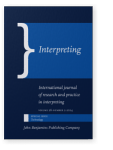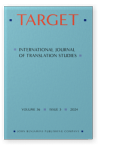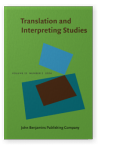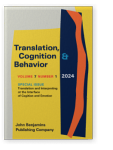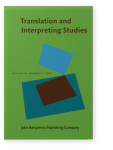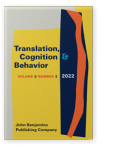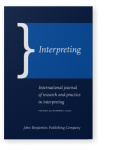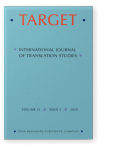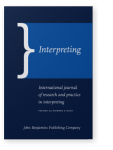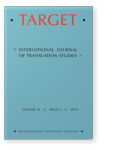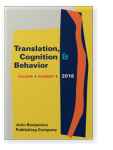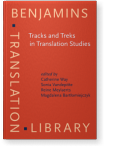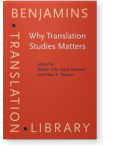Agnieszka Chmiel
List of John Benjamins publications for which Agnieszka Chmiel plays a role.
Journals
ISSN 1932-2798 | E-ISSN 1876-2700
2024 Syntax, stress and cognitive load, or on syntactic processing in simultaneous interpreting Translation and Interpreting at the Interface of Cognition and Emotion, Rojo López, Ana María and Purificación Meseguer Cutillas (eds.), pp. 22–47 | Article
This corpus-based study examines the effect of syntactic complexity in the source language on simultaneous interpreters’ cognitive load and stress. Previous studies show contrasting results regarding the source text syntax and cognitive load in interpreting, while the link between syntactic… read more
2024 Automatic subtitles increase accuracy and decrease cognitive load in simultaneous interpreting Technology, Pöchhacker, Franz and Minhua Liu (eds.), pp. 253–281 | Article
This study examines the effect of real-time subtitles generated by automatic speech recognition (ASR) technology on interpreting accuracy and interpreters’ cognitive load. Multiple measurements — including interpreting accuracy, the NASA-TLX for subjective ratings of cognitive load, eye-tracking… read more
2023 Reading patterns, reformulation and eye-voice span (IVS) in sight translation Translation and Interpreting Studies 18:2, pp. 213–234 | Article
The study examined how a required reformulation of a source text affects reading patterns in sight translation. We also tested how interpreters regulated their eye-voice span (IVS, understood as the delay between viewing the source language word and speaking it in the target language) in the… read more
2022 Testing the impact of remote interpreting settings on interpreter experience and performance: Methodological challenges inside the virtual booth Translation, Cognition & Behavior 5:2, pp. 250–274 | Article
This paper presents methodological challenges in a study focusing on the impact of remote interpreting settings on interpreter experience and performance. In recent years, the practice of simultaneous interpreting has undergone a robust development with the quick uptake of remote interpreting… read more
2021 Effects of simultaneous interpreting experience and training on anticipation, as measured by word-translation latencies Interpreting 23:1, pp. 18–44 | Article
This study aims to investigate the influence of interpreter training and conference interpreting experience on anticipation, as measured by word-translation latencies in a semantically constrained context. It involved professional conference interpreters, on the one hand, and, on the other,… read more
2020 Multimodal processing in simultaneous interpreting with text: Interpreters focus more on the visual than the auditory modality Target 32:1, pp. 37–58 | Article
The present study focuses on (in)congruence of input between the visual and the auditory modality in simultaneous interpreting with text. We asked twenty-four professional conference interpreters to simultaneously interpret an aurally and visually presented text with controlled incongruences in… read more
2020 The eye or the ear? Source language interference in sight translation and simultaneous interpreting Interpreting 22:2, pp. 187–210 | Article
In the current study we set out to investigate source language interference in the visual modality (in sight translation – ST) and in the auditory modality (in simultaneous interpreting – SI). We probed interpretations of cognates, interlingual homographs and passive structures in single sentence… read more
2019 Syntactic processing in sight translation by professional and trainee interpreters: Professionals are more time-efficient while trainees view the source text less Target 31:3, pp. 378–397 | Article
The study examines how professional and trainee interpreters process syntax in sight translation. We asked 24 professionals and 15 trainees to sight translate sentences with subject-relative clauses and more difficult object-relative clauses while measuring translation accuracy, eye movements… read more
2018 Meaning and words in the conference interpreter’s mind: Effects of interpreter training and experience in a semantic priming study Translation, Cognition & Behavior 1:1, pp. 21–41 | Article
The aim of the study was to examine how interpreter training and experience influence word recognition and cross-linguistic connections in the bilingual mental lexicon. Sixty-eight professional interpreters, interpreter trainees (tested at the beginning and end of their training) and bilingual… read more
2013 Eye tracking sight translation performed by trainee interpreters Tracks and Treks in Translation Studies: Selected papers from the EST Congress, Leuven 2010, Way, Catherine, Sonia Vandepitte, Reine Meylaerts and Magdalena Bartłomiejczyk (eds.), pp. 189–205 | Article
This paper presents results of an eye tracking study involving sight translation. It was assumed that interpreting trainees at a more advanced stage of training would display more efficient reading patterns than their less experienced colleagues. Eighteen participants with either one year or two… read more
2010 Interpreting Studies and psycholinguistics: A possible synergy effect Why Translation Studies Matters, Gile, Daniel, Gyde Hansen and Nike K. Pokorn (eds.), pp. 223–236 | Article
Cognitive information processing has long been an area of interest for Interpreting Studies scholars. This paper discusses the interdisciplinary relation between Interpreting Studies (IS) and psycholinguistics as a source of a possible synergy effect and explains why Interpreting Studies matters… read more
